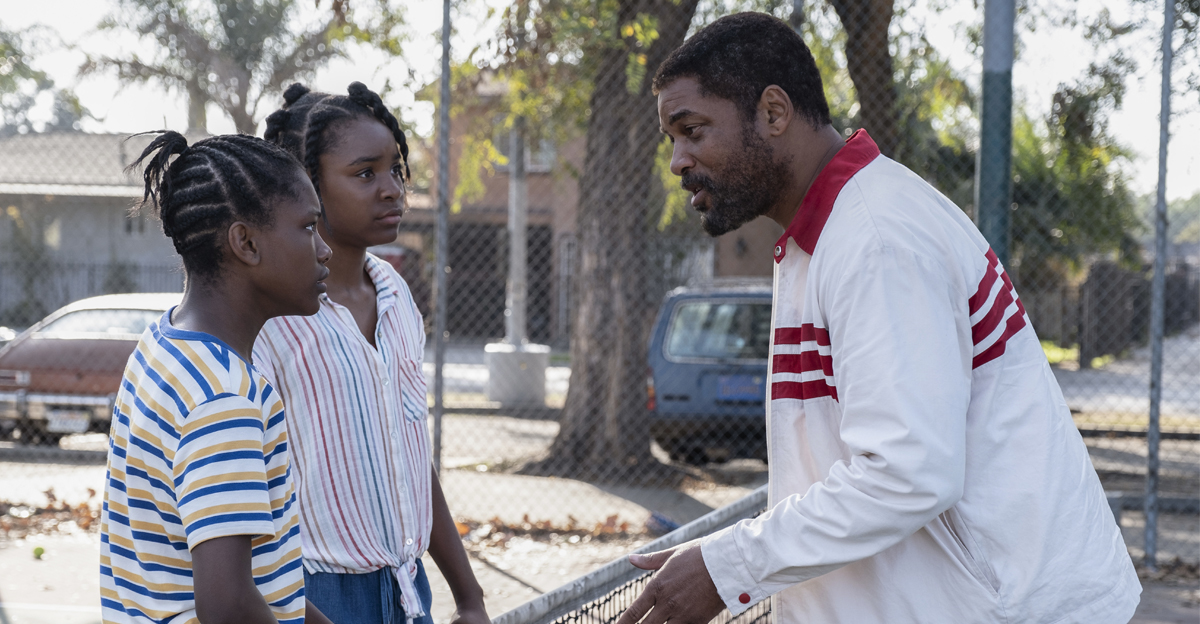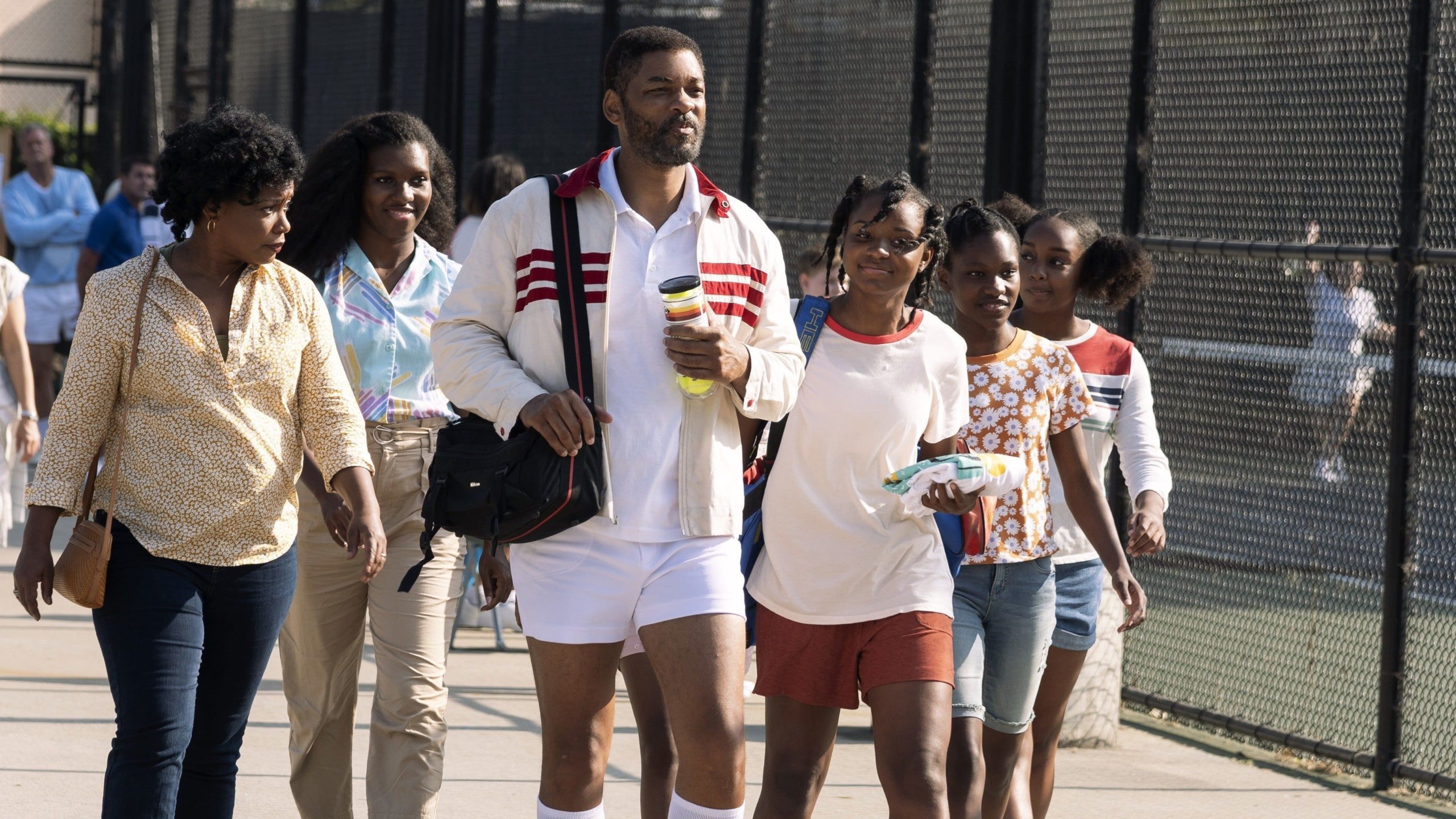'Hawkeye' Episode 4 Review: Things Just Got Real
In episode 4 of 'Hawkeye,' things are getting real, from a mystery surrounding a Rolex watch to hints at a certain "big guy" to the reveal of [SPOILER].
Incluvie Foundation Gala - Learn More


King Richard tells the story of Richard Williams as he coached his daughters Venus and Serena Williams to tennis stardom. The story is based on the real-life experiences of the Williams family’s kids Serena and Venus.
King Richard paints a nuanced portrait of a Black father trying to ensure his daughters’ success in a white-dominated sport. This film is ultimately about a father who’s afraid—afraid his daughters won’t receive the respect they deserve and therefore he won’t receive the respect he deserves. Yet, Richard and his daughters overcome that fear and adversity to succeed and win the utmost respect. Serena and Venus are still overcoming adversity to this day, which is truly what makes King Richard’s movie for kids such a powerful film.
Richard (Will Smith) is a complicated man. He does what he thinks is right to help his girls succeed. He pushes them harder than other parents might, yet always wants them to be kids. He has a wonderful relationship with his daughters, showcased in their funny, sweet conversations. From the moment his children are born, he sees a bright future for them and works to manifest that future. One of the best things he does is cultivate his daughters’ confidence. In America’s patriarchal society founded on racist principles to keep white people in power and POC oppressed, Richard’s daughters are perhaps the most susceptible targets for oppression as young, darker-skinned Black girls. But Richard never lets them think lowly of themselves. He repeatedly assures them they can do anything, that one day they’ll live in mansions, be rich, etc. One of the most powerful things he says is this:
“The strongest, the most powerful, the most dangerous creature on this whole earth is a woman who knows how to think. Ain’t nothing she can’t do.”

But Richard is by no means a perfect father. He does some questionable, downright awful things. The most obvious one is when he tries to leave his daughters at the store and forces them to walk home alone. His reasoning is he’s trying to teach them a lesson: stay humble. That’s a twisted way to go about it and seems hypocritical given this is the same man who put himself in harm’s way to protect his girls from gangs. He could’ve endangered their lives by leaving them there.
Richard is impulsive. He’s shown throughout the whole movie to be a planner—his mantra is “If you fail to plan, you plan to fail”—but he also doesn’t think things through sometimes. He’s a contradictory character, which makes him real. Richard is layered, three-dimensional, and nuanced. He’s a father who walked out on previous families but devotes himself entirely to this one. He loves his daughters but also pressures them. A lot of Richard’s parenting can be explained by his identity as a Black man suffering from intergenerational trauma and struggling not to put that trauma onto his girls. He just wants respect.
Richard works hard to protect and uplift his daughters Venus (Saniyya Sidney) and Serena (Demi Singleton). The young actresses who play the sisters are fantastic. Venus and Sidney are unabashedly confident. It’s not an act for the cameras or their father; they wholeheartedly believe in their talents. Yet, the girls never brag or slander other opponents because of the virtues instilled in them by their father. This beautiful combination of confidence and humbleness makes them particularly great characters and real-life role models for young Black girls and all female athletes.

Venus begins her career as a child star. Venus’s father is afraid of her becoming a victim of burnout. Putting a child under public scrutiny is a dangerous game to play, and Richard wants no part in it. When Richard sees Jennifer Capriati—former world number one tennis player, an inspiration to his children—arrested for possession of marijuana, he knows he can’t let the same thing happen to his girls. Although it remains unsaid, it’s important to note that his girls would most likely be attacked by the press much more severely than their white counterparts because of the color of their skin. So Richard refuses Venus’s request to play in the Bank of the West tournament even though he’s kept her out of matches for three years already.
This choice is what finally breaks the rising tension between Richard and Venus, Brandy, and Macci. The girls’ coach Rick Macci (John Bernthal) calls Richard out for pressuring his girls so much when Richard claims he’s trying to avoid exactly that. But it’s true: Richard pushes his girls hard in school and on the court. He’s been pressuring them to conform to his perfect plan since the day they were born. It’s because he knows his girls have to be the best just to be recognized alongside the other white players. He repeatedly claims that they’re the best, worth a million dollars, etc. However, even if it’s to help build his girls’ confidence as he claims, he’s also being selfish. Richard wants to boost his ego. He’s had to deal with the KKK, the police, and “rich white boys” when he was young. (Although the movie sometimes makes it seem as though those things are in the past, all are still threats to the Black community, exhibited in so many recent and ongoing cases, like George Floyd’s murder, Kyle Rittenhouse’s acquittal, and the shooting of Ahmaud Arbery. Little hints of the ongoing threats peek through in King Richard, like when the police beating of Rodney King is featured on TV.) Richard has suffered disrespect and oppression for so long—an experience universal in varying severity to the Black community—that his fear of the same thing happening to his daughters overcomes him.
His wife, Oracene “Brandy” Williams (Aunjanue Ellis), calls Richard’s fear out. While Richard claims he came up with the plan and worked so hard to ensure it was perfectly executed, Brandy points out how she’s been here all along, too. She’s been working to perfect that plan. Her hard work can’t be ignored. When Brandy pointed this out, I couldn’t help but wish we’d gotten more of her side of the story. She coached her daughters, worked as a nurse, and took care of her five children and her husband.

Only once Richard explains to Venus his fear and faces it, he truly succeeds. He allows Venus to go out on her own and play against Arantxa Sánchez Vicario where she holds her own but ultimately loses. Venus feels like a failure. Her father told her earlier that she would ” represent every little Black girl on Earth.” That’s such a heavy burden to put onto a child’s shoulders, yet Venus carries it with grace. Her parents reassure her they are proud of her and that nothing has changed. Venus walks out of the stadium and is received by cheering crowds. It’s a beautiful moment.
King Richard is a wonderful film all around, especially for Black representation. Will Smith’s performance deserves awards for his emotional range and the way he physically and verbally embodies the real-life Richard Williams. King Richard‘s depiction of a Black father is one that never falls into a stereotype. He’s not absent; he’s extremely present. The movie highlights his strengths while refusing to hide his flaws. The representation of a supportive Black family and confident young Black girls is so positive. The nods to their culture—particularly the scene when Oracene is braiding and beading her daughter’s hair while reminding them of Sojourner Truth—are important, too. I hope we see Black families portrayed in-depth like this in more mainstream media.
King Richard is currently in theaters and streaming on HBO Max.
Related lists created by the same author
In episode 4 of 'Hawkeye,' things are getting real, from a mystery surrounding a Rolex watch to hints at a certain "big guy" to the reveal of [SPOILER].
Related diversity category
This Halloween movie is based on the toy line of the same name.